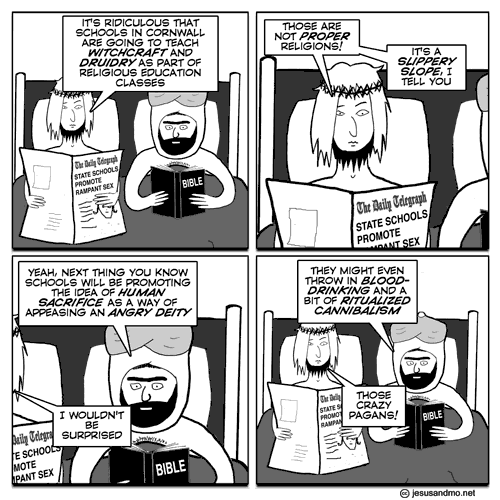I happened across a twitter user, @MichaelLicona, who wanted to promote his web site of videos about the resurrection of Jesus. His
wikipedia page says that he is a New Testament Scholar and hold a PhD in New Testament Studies. It turns out that he was fired last year from a university post and lost his appointment as apologetics coordinator for the North American Mission Board last year, after an argument about biblical inerrancy. Let us set the disagreements of God's followers aside, and look at their other claims though.
I was curious to know what intellectual powers were required for a doctorate from the University of Pretoria. Just for fun I decided to watch the videos and play 'spot the logical fallacy'. It soon became clear that the site was there to promote sales of a DVD which promises to give more information. You would think that he would work hard to present some good stuff in these short trailers if he wanted to be sucessful with his sales. I don't think he succeeded. After replying to his tweet politely it is interesting that he unfollowed me.
The host site is called Apologetics 315, which you can find at the address given at the end in plain text. I don't want to raise their ratings by making a link. The specific page is called
Ten Myths about the Ressurection. There are ten videos of about 2 minutes, but the actual useful content of each is more like 30 seconds. Let's summarise them, and yes, laugh at them!
Myth 1: Contradictions in the Gospels
His pathetic excuses in this episode contained no evidence at all. He used the 'no credible historian' fallacy which, being a 'New Testament Scholar', he must know to be untrue. He also claims that the contradictions are easily harmonisable. You would think he would provide some evidence for such a claim.
I would contest that no credible historian would actually
accept the bible as unbiased evidence, especially when no other contemporary historians record anything about the amazing events surrounding Jesus.
The failure of this, the most important argument of the set, undermines all the rest of the videos very effectively.
Myth 2: Pagan Parallels in the Mystery Religions
The pagan parallels of dying a rising mythical figures are not parallels at all, he claims. Of course most of these were mistaken or the accounts post-date the gospels. (Really?) Some of the others were coincidences. So at least he accepts the existence of these claims.
Who knows whether any contain any truth, but claiming that he has consulted other scholars proves little. We all know that you can find scholars to make any case that you can think of.
Myth 3: The Fraud Theory
The 'not a single credible' fallacy comes up again, althought this time it is scholars rather than historians. (The question of whether there is a single credible fact in the NT is never mentioned.) "
The fact that they were prepared to die . . ." and the conversion of Paul prove it all. As commonly happens, Licona is deliberately pretending that the bible is an undisputed factual account of history. In fact, the bible contains no facts, but a lot of anecdotes, and quoting it proves nothing at all.
He must know this. He's an NT scholar!
Myth 4: Hallucinations
He says it is not true that the disciples were so grief-stricken that they hallucinated, but that they really experienced them. Apparently the mass halucinations in the bible 'show' that its not just anecdotal, and again, Paul's conversion was obvious proof. Well actually, mass hallucinations
do take place and they prove only one thing - that the whole crowd hallucinated. Usually, when properly investigated, you find that they all hallucinated different things which are mutually inconsistent.
Maybe that is evidence for the bible after all then. They were certainly successful in disagreeing with each other.
Myth 5: It's a Matter of Faith
By misrepresenting evolution as an analogy, and then comparing scientific evidence with apparent (unsupported) historical evidence, he proves that it is not just a matter of faith. This is a typical use of analogy to prove things that you can't know!
Myth 6: Apparent Death Theory
The argument that Jesus died on the cross assumes once more that the bible is historical evidence. He uses Josephus to 'prove' that people were unlikely to survive crucifixion, even if removed while alive. Then comes the hard sell - order my DVDs within the next 30 minutes and I guarantee that you will get exactly what we promise.
I wonder what happens
after 30 minutes then!
He is still neglecting to cover the real question of the huge differences between the accounts in the gospels - and that surprisingly one of them even completely neglects to mention the resurrection!
Myth 7: It Was Merely Legend
All these 'eye-witnesses', the original apostles, show that it was not a legend. You can't accuse them of lying or hallucinating. However, whatever he says, eye-witness accounts written down decades later prove nothing. Memory is modified with time - and the scientific evidence for this is now very strong. The fact that it is unreliable has famously been demonstrated since the 911 disaster where people were asked for their accounts of the event the day afterwards, and then re-examined several years later. Their accounts were inconsistent with each other to the extent that many of them could not believe that they had ever made the original statements.
Myth 8: Science Proves that Resurrections Cannot Occur
This Dr of things you can't know now seems to know all about science. He uses another analogy which singularly fails to convince. This one is an excellent example of special pleading!
Myth 9: Not Enough Evidence
He begs to differ about whether there is evidence and again makes the mistake of thinking that the bible is evidence. By making a comparison with the evidence for Caesar Augustus he shows his true hand. Millions of independent strands of evidence for his existence have been found. Here is one of them!
 |
Proof! - Yes proof of disingenuous apologist arguments.
Where is there such good evidence for the existence of Jesus? |
Myth 10: Lost Gospels.
The Lost Gospels' different accounts apparently can't be believed. However, the debate about when the lost gospels were written apparently doesn't apply to the canonical gospels themselves. Even the earliest of the lost gospels, Thomas, apparently tells nothing about the resurrection and therefore the bible
must be true. Once again - a pathetic argument which neglects the disagreement between the different biblical accounts.
Even the two girls who were sitting in the background didn't last to the end of this charade!
I did see one sensible thing on that site though:
“Apologists cannot be content to depend on borrowed answers. They need
to develop answers for themselves. In short, they need to own their
answers. Never give an answer to a question that doesn’t satisfy you in
the first place.” - Alister McGrath
On that basis most apologists ought to be a bit quieter!
Should you want to have a laugh too, the two addresses are:
http://www.apologetics315.com/ and
http://www.apologetics315.com/2012/04/top-ten-myths-about-resurrection.html






















